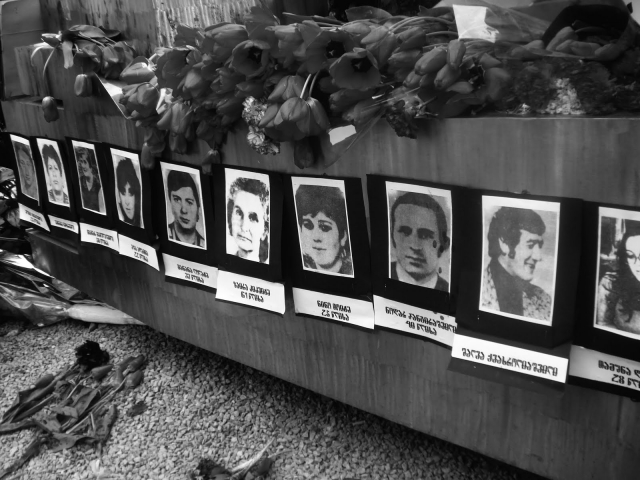Remembering Georgia’s Recent Past in Order to Carve a New Future
OPED
April 9 marks a sombre day in Georgia’s recent collective memory. It was on that day 27 years ago that Soviet interior ministry troops gunned down dozens of patriotic citizens in the streets of Tbilisi.
Most of those who died that day were some of the country’s youngest and brightest, all of who dreamt of a free and independent Georgia. Their life was cut short before they ever had an opportunity to experience the beauty of life or to see the country they loved so much finally have its chance to choose its own path.
Rehashing the discussion over who was responsible and how those tragic events played out is a pointless exercise. What’s paramount is to remember the events for what they represented and that they took place a relatively short time ago.
Because of the events that took place recently in our city, when being still very young, we clearly saw.
The tragic events of April 1989 were a turning point for Georgia’s people. They proved that we, as a people, could are forced to unite in times of hardship. That we were capable of banding together when the odds were against us and stand up to a criminal and corrupt totalitarian state.
Though the full force of the Soviet Union’s security services were brought to bare on innocent civilians who wished to exercise their right to protest, Georgian unity led toa call to break free from Moscow.
That unity, however, barely lasted a year as the national movement under the leadership of the mercurial nationalist Zviad Gamsakhurdia established a political union with various other parties that irreversibly split the movement.
Two years after the events in 1989, Gamsakhurdia declared Georgia an independent.
Despite the nervous euphoria felt in certain parts of the country, the sudden chaos caused by the collapse of Soviet authority doomed Gamsakhurdia and the messianic-like cult that made up the bulk of his followers.
Quickly overthrown by his one-time allies, anarchy and civil war engulfed the nation by the end of 1991. Though the country was newly independent of Russia’s direct rule, their passive-aggressive support of paramilitary groups operating in Tbilisi threatened the country with a warlord-style military dictatorship.
The events of more than two decades ago continue to haunt our nation. At a time when the world’s developing nations grow and accumulate more wealth and self-confidence as they express their nationality identity, there remains a core group of people in Georgia for whom the events of 1989 and 1991 mean nothing.
They are the same group who has collectively dismissed the Bolsheviks’ invasion and annexation of Georgia in 1921, Moscow’s decision to open fire on anti-Soviet protestors in 1956, the Communist Party’s attempt to legally eradicate the Georgian language in 1978 and, of course, the tragic spilling of so much blood on April 9, 1989.
They are a group who excuse the horrible tragedy that occurred in Abkhazia in 1992-93 or Moscow’s near-exact replay of those earlier events in the 2008 war.
Their salvation and only loyalty lie with one individual, Vladimir Vladimirovich Putin.
Built on the blood-soaked foundations of Stalin’s Evil Empire, Putin’s Russia remains a saviour source of stability. There’s no question that Putin’s KGB background serves him and his inner circle well when they blatantly cater to the lowest common denominator of society.
By playing on Soviet nostalgia, they fool Georgia’s working class into forgetting that personal freedom no longer exists in Russia.
It is those types of limitations that will doom Georgian society. By constantly looking to our neighbors, we always risk succumbing to their influence. Georgia’s leaders lost the art of intelligent diplomacy centuries ago.
We have not had a rational or logical leader who can articulate the ambitions of Georgia’s burgeoning democratic state since before Russia incorporated the country into their empire more than two centuries ago.
Georgians must remember that we chose a democratic path for the country more than a generation ago. That choice was born out of our longing to manage our own affairs, free of the influence of outsiders.
We must now begin to manage ourselves, without the domination of interested third parties who claim to be our permanent partners. Georgia must, instead, act in its own interests. And those interests must be permanent.
There will be severe consequences for choosing this path, but they can be overcome with the right focus and dedication.
By George Labadze
Edited by Nicholas Waller
Photo: qarteli.files.wordpress.com












